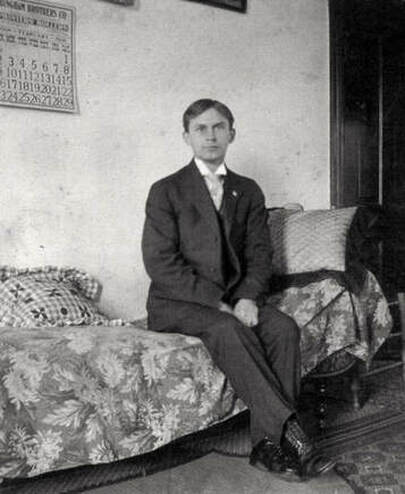
By Judy Zeck
Ira Clifford Moser was the author of the History of Myersville, Frederick County, Maryland, including Biographical Sketches of its Representative Men, published in 1905 by the Myersville Monitor newspaper. The book was later reprinted in 1971 with an updated history of Myersville written by Thomas Rose and Charles Martin and published by the Myersville Volunteer Fire Company.
(Left: Ira Moser seated on a daybed, taken in 1908 according to the calendar on the wall.)
Anyone interested in the history of the Myersville area owes Moser a debt of gratitude for the 1905 history. It is considered a handbook by those who want to understand Myersville at the time of its incorporation in 1904, just as the trolley was coming to town and as the town became the hub of the surrounding farming community. The book has been quoted in other publications about Frederick County and Maryland towns. Those of us now living deeply appreciate that Ira Moser took the time to write wrote about life in the town he was raised in, but it can be gleaned from newspaper reports of the time that Ira Moser, was not always appreciated by his contemporaries.
Ira Clifford Moser was the author of the History of Myersville, Frederick County, Maryland, including Biographical Sketches of its Representative Men, published in 1905 by the Myersville Monitor newspaper. The book was later reprinted in 1971 with an updated history of Myersville written by Thomas Rose and Charles Martin and published by the Myersville Volunteer Fire Company.
(Left: Ira Moser seated on a daybed, taken in 1908 according to the calendar on the wall.)
Anyone interested in the history of the Myersville area owes Moser a debt of gratitude for the 1905 history. It is considered a handbook by those who want to understand Myersville at the time of its incorporation in 1904, just as the trolley was coming to town and as the town became the hub of the surrounding farming community. The book has been quoted in other publications about Frederick County and Maryland towns. Those of us now living deeply appreciate that Ira Moser took the time to write wrote about life in the town he was raised in, but it can be gleaned from newspaper reports of the time that Ira Moser, was not always appreciated by his contemporaries.
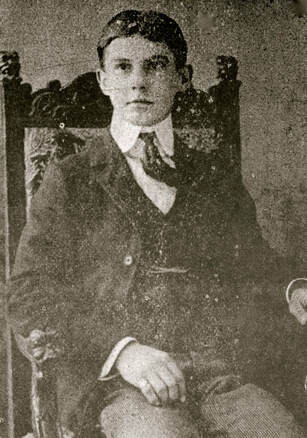
A picture of Moser (right) was included at the front of his history. One is immediately struck by how young he looks. The fact is he wasn't very old when he wrote the History of Myersville. As he put it, it was “written during the spare moments of the Author, at odd times not taken up in the publication of his weekly paper, has occupied his attention for over one year.”
Ira Moser was born on February 7, 1881, making him 24 at the time the History of Myersville was published. He was the youngest son of Isaiah Moser (1838-1922) and Sarah Elizabeth Routzahn Moser (1839-1925) of Myersville. Among his older siblings was William G. Moser (1867-1936), who was 15 years Ira's senior. Ira’s father Isaiah was one of those elected to the first Town Council (then called Commission) when Myersville incorporated in 1904.
In the census records of 1900, Ira Moser was listed as a mason, as were his father Isaiah and his older brother William. But Moser took over as editor of the Myersville Monitor in 1901 with William employed as the newspaper's compositor. The Monitor was the successor to the Frederick County Globe which was started by Myersville native Reno S. Harp, who went on to become a prominent Frederick attorney.
Just two years later, Ira married. According to the Frederick Daily News of April 7, 1903, under the headline “Editor Wins Fair Bride: Mr. Ira C. Moser, of Myersville and Miss Harp of Ellerton, Elope,” “On Sunday morning last, while her parents were in church, Miss Myrtle Harp, daughter of Elder Geo. S. Harp of Ellerton, this county, eloped with Mr. Ira C. Moser, editor of the Myersville Monitor. The couple went to Hagerstown, where they were married yesterday at the home of Mr. Herbert Souders by Rev. J. S. Simon.
A previous attempt of this couple to elope was frustrated by Miss Harp’s father. The bride is a handsome and accomplished lady and had many admirers, but the editor won the contest for her hand.
"The groom is perhaps the youngest newspaper editor in the State of Maryland being only twenty-two years of age. He assumed charge of the Myersville Monitor in 1901. He is a young man of thorough business qualities and has the interests of his home people at heart.”
Ira and Murdie had their first son, Harold, on 15 May, 1904.
By 1905, the Moser brothers were experiencing the ire of their fellow townsfolk, prompting Ira Moser to publicly respond. In the December 7, 1905, issue of the Valley Register, the following editorial comment was printed: “We desire to have it understood that no one is compelled to take this paper. During the past week several readers were dealing out slurs and threatening to stop the Monitor. We have no patience with such lowsey [sic] curs who cannot come face to face and state their grievances. Their conversation is symbolic of all such 'whispering whining whelps,' as it seems as though their mission is one of villainy and a villain never attacks anyone in the open. If such pie-faced pukes desire the paper discontinued, we will most willingly do it and tear out the page their name is written upon. In fact, we would rather not have any relations with such Spanish jackasses, with a pedigree a mile long. This is not the first occasion these chronic whelps have endeavored to injure this publication with their lying tongue.”
There is no indication what issue started this dispute and it’s not known how many people had problems with the paper.
The following week, in the Monitor's 14 December, there appeared: “Last Sunday night a letter was slipped under the office door reminding the editor that incidents of his past life did not justify him starting a reform movement in this place. Of this fact the editor is painfully aware. Can’t a poor devil reform?
“If Christ died to save sinners, then why not we be included? And if the Apostle Paul was the renegade that the Bible teaches us he was, before he quit his meanness, then why not permit the editor of this paper to reform?
“If it is possible that a sinner can come in at ‘the eleventh hour’ and be rewarded, then why not permit the editor of the Monitor to ‘sneak’ in just before dinner without a lot of grouchy cusses raising the devil about it?”
Ira Moser was born on February 7, 1881, making him 24 at the time the History of Myersville was published. He was the youngest son of Isaiah Moser (1838-1922) and Sarah Elizabeth Routzahn Moser (1839-1925) of Myersville. Among his older siblings was William G. Moser (1867-1936), who was 15 years Ira's senior. Ira’s father Isaiah was one of those elected to the first Town Council (then called Commission) when Myersville incorporated in 1904.
In the census records of 1900, Ira Moser was listed as a mason, as were his father Isaiah and his older brother William. But Moser took over as editor of the Myersville Monitor in 1901 with William employed as the newspaper's compositor. The Monitor was the successor to the Frederick County Globe which was started by Myersville native Reno S. Harp, who went on to become a prominent Frederick attorney.
Just two years later, Ira married. According to the Frederick Daily News of April 7, 1903, under the headline “Editor Wins Fair Bride: Mr. Ira C. Moser, of Myersville and Miss Harp of Ellerton, Elope,” “On Sunday morning last, while her parents were in church, Miss Myrtle Harp, daughter of Elder Geo. S. Harp of Ellerton, this county, eloped with Mr. Ira C. Moser, editor of the Myersville Monitor. The couple went to Hagerstown, where they were married yesterday at the home of Mr. Herbert Souders by Rev. J. S. Simon.
A previous attempt of this couple to elope was frustrated by Miss Harp’s father. The bride is a handsome and accomplished lady and had many admirers, but the editor won the contest for her hand.
"The groom is perhaps the youngest newspaper editor in the State of Maryland being only twenty-two years of age. He assumed charge of the Myersville Monitor in 1901. He is a young man of thorough business qualities and has the interests of his home people at heart.”
Ira and Murdie had their first son, Harold, on 15 May, 1904.
By 1905, the Moser brothers were experiencing the ire of their fellow townsfolk, prompting Ira Moser to publicly respond. In the December 7, 1905, issue of the Valley Register, the following editorial comment was printed: “We desire to have it understood that no one is compelled to take this paper. During the past week several readers were dealing out slurs and threatening to stop the Monitor. We have no patience with such lowsey [sic] curs who cannot come face to face and state their grievances. Their conversation is symbolic of all such 'whispering whining whelps,' as it seems as though their mission is one of villainy and a villain never attacks anyone in the open. If such pie-faced pukes desire the paper discontinued, we will most willingly do it and tear out the page their name is written upon. In fact, we would rather not have any relations with such Spanish jackasses, with a pedigree a mile long. This is not the first occasion these chronic whelps have endeavored to injure this publication with their lying tongue.”
There is no indication what issue started this dispute and it’s not known how many people had problems with the paper.
The following week, in the Monitor's 14 December, there appeared: “Last Sunday night a letter was slipped under the office door reminding the editor that incidents of his past life did not justify him starting a reform movement in this place. Of this fact the editor is painfully aware. Can’t a poor devil reform?
“If Christ died to save sinners, then why not we be included? And if the Apostle Paul was the renegade that the Bible teaches us he was, before he quit his meanness, then why not permit the editor of this paper to reform?
“If it is possible that a sinner can come in at ‘the eleventh hour’ and be rewarded, then why not permit the editor of the Monitor to ‘sneak’ in just before dinner without a lot of grouchy cusses raising the devil about it?”
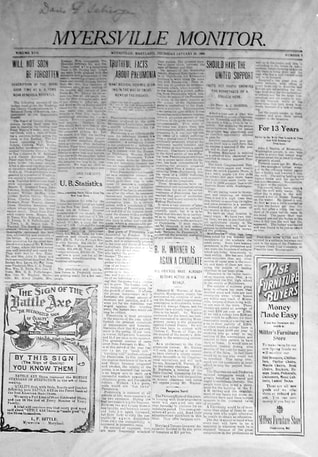
Whatever past sins the editor of the Monitor acknowledged, they had apparently not affected the sales of the Monitor. In the December issue of the Brunswick Herald, we read, “With its last issue, the Myersville Monitor completed its 14th volume with every evidence of prosperity. Its record of 135 new subscribers in four weeks is proof of positive growth. The Monitor is ably edited and faithfully portrays the local news of the upper portion of the valley.” The Herald goes on to acknowledge the problems with “some Chronic Kicker” but admires the “barehanded way” the editor of the Monitor is dealing with them.
Problems were not over for Ira Moser. In the September 7, 1906, Valley Register the following appeared: “Editor Moser Attacked. Mr. Ira C. Moser, editor and proprietor of the Myersville Monitor was attacked in the kitchen of his home by an unknown person about 10:20 o’clock Wednesday night and knocked unconscious. The weapon used was a club but the blow did not badly injure Mr. Moser. He was still confined to his bed from the shock, at noon yesterday.”
The article goes on to describe how Moser had been to the measuring social of the Christian Endeavor Society of the Lutheran church. When he arrived home, Mrs. Moser came downstairs to let him in the house. In the house he discovered that the door to the garden was open and when he went to close it, he was seized from behind by a man who struck him across the forehead with a piece of wood. Mrs. Moser hearing what happened screamed for help and George W. Bittle, Joseph Wolf, and Robert Ridgely went to her assistance. They found Ira Moser lying on the kitchen floor unconscious, but they soon restored him. A piece of wood was found lying on the floor. Moser did not see the person who attacked him. Many thought that it was an attempt at robbery, as Ira Moser had collected the money at the social and it was perhaps thought he had it in his possession.
There is no indication that anyone was apprehended in connection with this incident.
The Cumberland Evening Times of 4 January, 1907, reported under the headline, "Newspaper Office Wrecked: Miscreant Enters Office of Myersville Monitor," that “Sometime Wednesday night the Monitor office, at Myersville this valley, was entered by unknown persons, who completely wrecked the place.
All the forms, which were ready for this week’s paper, were demolished, all the cases were upset, and the jumble of type was swept or pushed together in a heap on the floor. The editor and proprietor, Mr. Ira C. Moser, will make no effort to sort the mess out, treating it all as junk. It is thought that some communications which have been appearing in the paper led to the act.”
Also later in January of 1907, William Moser was attacked and beaten up by two high school students. Edgar Hauver and Harry Garnand, students at Myersville High School, were arrested for the attack.
According to the Frederick paper, “The trouble grew out of the series of communications which some time ago appeared in the Myersville Monitor and which, it is generally believed, led to the wrecking of that office some weeks ago by a midnight visitor. It is said that the High School students charged Mr. Moser of being the author of some of the communications and taunted him about it. On Thursday night of last week, while Mr. Moser was keeping store for his brother, it is charged that some young men in the place including Hauver, quoted a rhyme that was offensive to Mr. Moser and he put Hauver out of the store.
"About 6:30 Friday night, January 25, as Moser was on his way to his brother’s store, he was halted between the car barn and the store by Hauver and Garnand and was told by Hauver to prepare to settle matters then and there. Hauver then hauled off and struck Moser a heavy blow in the face. Moser is a heavy set man but the blow felled him. It is charged that Hauver then jumped on him and gave him a severe pounding. It was also charged that Garnand kicked Moser in the face when he was down, but this is denied by him and others. Moser was badly injured, his face being a sight from ugly bruises. Dr. Browning dressed Moser’s injuries."
In March, Edgar Hauver and Harry Garnand went before the court. It was said then that the assault grew out of some article appearing in the Monitor, of which Moser was alleged to be the author, and which reflected badly upon Garnand and Hauver. Hauver pled guilty to having struck Moser, and was fined $5 and costs. Garnand was found not guilty.
Problems were not over for Ira Moser. In the September 7, 1906, Valley Register the following appeared: “Editor Moser Attacked. Mr. Ira C. Moser, editor and proprietor of the Myersville Monitor was attacked in the kitchen of his home by an unknown person about 10:20 o’clock Wednesday night and knocked unconscious. The weapon used was a club but the blow did not badly injure Mr. Moser. He was still confined to his bed from the shock, at noon yesterday.”
The article goes on to describe how Moser had been to the measuring social of the Christian Endeavor Society of the Lutheran church. When he arrived home, Mrs. Moser came downstairs to let him in the house. In the house he discovered that the door to the garden was open and when he went to close it, he was seized from behind by a man who struck him across the forehead with a piece of wood. Mrs. Moser hearing what happened screamed for help and George W. Bittle, Joseph Wolf, and Robert Ridgely went to her assistance. They found Ira Moser lying on the kitchen floor unconscious, but they soon restored him. A piece of wood was found lying on the floor. Moser did not see the person who attacked him. Many thought that it was an attempt at robbery, as Ira Moser had collected the money at the social and it was perhaps thought he had it in his possession.
There is no indication that anyone was apprehended in connection with this incident.
The Cumberland Evening Times of 4 January, 1907, reported under the headline, "Newspaper Office Wrecked: Miscreant Enters Office of Myersville Monitor," that “Sometime Wednesday night the Monitor office, at Myersville this valley, was entered by unknown persons, who completely wrecked the place.
All the forms, which were ready for this week’s paper, were demolished, all the cases were upset, and the jumble of type was swept or pushed together in a heap on the floor. The editor and proprietor, Mr. Ira C. Moser, will make no effort to sort the mess out, treating it all as junk. It is thought that some communications which have been appearing in the paper led to the act.”
Also later in January of 1907, William Moser was attacked and beaten up by two high school students. Edgar Hauver and Harry Garnand, students at Myersville High School, were arrested for the attack.
According to the Frederick paper, “The trouble grew out of the series of communications which some time ago appeared in the Myersville Monitor and which, it is generally believed, led to the wrecking of that office some weeks ago by a midnight visitor. It is said that the High School students charged Mr. Moser of being the author of some of the communications and taunted him about it. On Thursday night of last week, while Mr. Moser was keeping store for his brother, it is charged that some young men in the place including Hauver, quoted a rhyme that was offensive to Mr. Moser and he put Hauver out of the store.
"About 6:30 Friday night, January 25, as Moser was on his way to his brother’s store, he was halted between the car barn and the store by Hauver and Garnand and was told by Hauver to prepare to settle matters then and there. Hauver then hauled off and struck Moser a heavy blow in the face. Moser is a heavy set man but the blow felled him. It is charged that Hauver then jumped on him and gave him a severe pounding. It was also charged that Garnand kicked Moser in the face when he was down, but this is denied by him and others. Moser was badly injured, his face being a sight from ugly bruises. Dr. Browning dressed Moser’s injuries."
In March, Edgar Hauver and Harry Garnand went before the court. It was said then that the assault grew out of some article appearing in the Monitor, of which Moser was alleged to be the author, and which reflected badly upon Garnand and Hauver. Hauver pled guilty to having struck Moser, and was fined $5 and costs. Garnand was found not guilty.
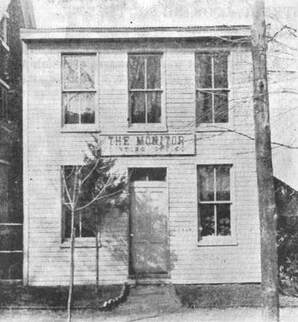
On April 12, 1907, we read in the Valley Register: "VANDALS AT WORK IN MYERSVILLE AGAIN. EDITOR MOSER’S PRESS PUT OUT OF SERVICE. When Editor Ira Moser, of the Myersville Monitor, was about to start his press yesterday (Thursday) afternoon, he discovered one set of the roller bearers had been smashed and the other set carried away, thus making the press useless until the broken and missing parts are replaced.
"Consequently, Mr. Moser was unable to print his edition for this week. It is not known when the act was committed, as it was not discovered until the press was about to be started. It could have been done any night between Thursday night of last week and yesterday morning. Mr. Moser says the windows and doors were found locked every morning and therefore the vandal or vandals must have used a false key to open the door.
It will be remembered that Mr. Moser’s printing office was wrecked by vandals on the night of Jan. 2 last, the forms of the paper and type from the cases being mixed into an inextricable heap. Some months before this, Mr. Moser was attacked in his home late at night and knocked senseless. The Valley Register then opined that Myersville was in need of a good detective and that such acts are outrages and the perpetrator deserve punishment.”
In a subsequent article in the Hagerstown Herald entitled “Talks AND Bosses,” there is the following paragraph, "Regarding to what we can learn of the editorial persecution that Ira Moser undergoes at Myersville, [it] is because he tries to boss the town and talks too much. It is not what is in his paper that annoys the lads so much. That is the way it is told to us.”
"Consequently, Mr. Moser was unable to print his edition for this week. It is not known when the act was committed, as it was not discovered until the press was about to be started. It could have been done any night between Thursday night of last week and yesterday morning. Mr. Moser says the windows and doors were found locked every morning and therefore the vandal or vandals must have used a false key to open the door.
It will be remembered that Mr. Moser’s printing office was wrecked by vandals on the night of Jan. 2 last, the forms of the paper and type from the cases being mixed into an inextricable heap. Some months before this, Mr. Moser was attacked in his home late at night and knocked senseless. The Valley Register then opined that Myersville was in need of a good detective and that such acts are outrages and the perpetrator deserve punishment.”
In a subsequent article in the Hagerstown Herald entitled “Talks AND Bosses,” there is the following paragraph, "Regarding to what we can learn of the editorial persecution that Ira Moser undergoes at Myersville, [it] is because he tries to boss the town and talks too much. It is not what is in his paper that annoys the lads so much. That is the way it is told to us.”
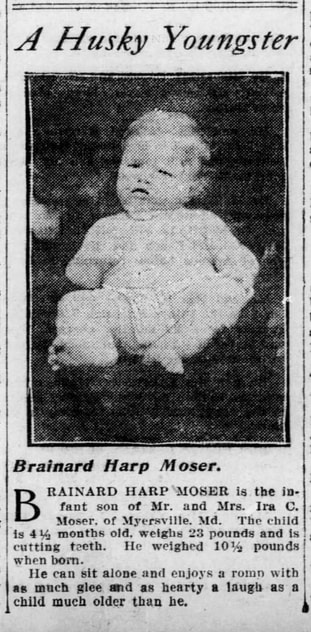
Ira Moser later ran for town council in Myersville but was not elected. Around this time, Moser decided running a newspaper in Myersville was not in his best interest. According the the Inland Printer, Volume 45, published in April 1910, “After a stormy career of several years, the Myersville, MD Monitor has suspended. Editor Ira C. Moser, on account of advocacy of what he considered needed reforms, was attacked on several occasions and his office raided.”
Moser and his wife welcomed another son, Vossburg, in April 1911. In an 11 October Baltimore Sun item, the newspaper calls out the infant for his robustness under the erroneous name Brainard.
Sometime between 1915 and late 1914, the Mosers moved west. A third son, Richard Hartley Moser, was born in Marion, Ohio, in November 1914. They were still there as of the 1920 census. Ira, aged 38, supported his family as a printer.
There were periodic reports of the Mosers visiting relatives in Myersville. At some point before 1930, Moser moved back to Maryland--first to Hagerstown, where he worked as a printer, then to Boonsboro where he operated a job printing office.
Ira Moser died on August 4, 1935, at the age of 54. He was survived by his wife Murdie and is sons, his brothers William and Elmer, and his sisters Flora Moser and Annie Moser Harshman. Murdie died in March 1972 at age 88. She had been living in Boonsboro, but was in Vindobona Nursing Home on Braddock Heights when she died.
Ira Moser did finally return to Myersville. He is buried in the cemetery of the St. Paul’s Lutheran Church with his wife, near to his parents and other family members. His gravestone can be seen below, left.
His son Harold (below, right) became a college professor and in his later years taught at Hood College. He also wrote articles for the Middletown Valley Register on the history of the Middletown Valley and the Myersville area. Dr. Harold Moser died in February of 1997 at the age of 92.
Moser and his wife welcomed another son, Vossburg, in April 1911. In an 11 October Baltimore Sun item, the newspaper calls out the infant for his robustness under the erroneous name Brainard.
Sometime between 1915 and late 1914, the Mosers moved west. A third son, Richard Hartley Moser, was born in Marion, Ohio, in November 1914. They were still there as of the 1920 census. Ira, aged 38, supported his family as a printer.
There were periodic reports of the Mosers visiting relatives in Myersville. At some point before 1930, Moser moved back to Maryland--first to Hagerstown, where he worked as a printer, then to Boonsboro where he operated a job printing office.
Ira Moser died on August 4, 1935, at the age of 54. He was survived by his wife Murdie and is sons, his brothers William and Elmer, and his sisters Flora Moser and Annie Moser Harshman. Murdie died in March 1972 at age 88. She had been living in Boonsboro, but was in Vindobona Nursing Home on Braddock Heights when she died.
Ira Moser did finally return to Myersville. He is buried in the cemetery of the St. Paul’s Lutheran Church with his wife, near to his parents and other family members. His gravestone can be seen below, left.
His son Harold (below, right) became a college professor and in his later years taught at Hood College. He also wrote articles for the Middletown Valley Register on the history of the Middletown Valley and the Myersville area. Dr. Harold Moser died in February of 1997 at the age of 92.
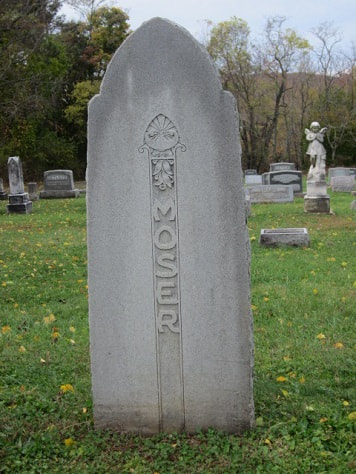
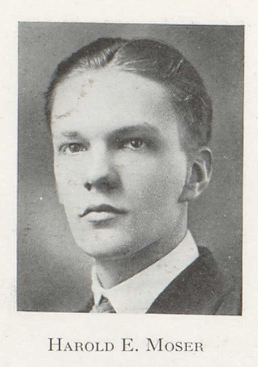
 RSS Feed
RSS Feed